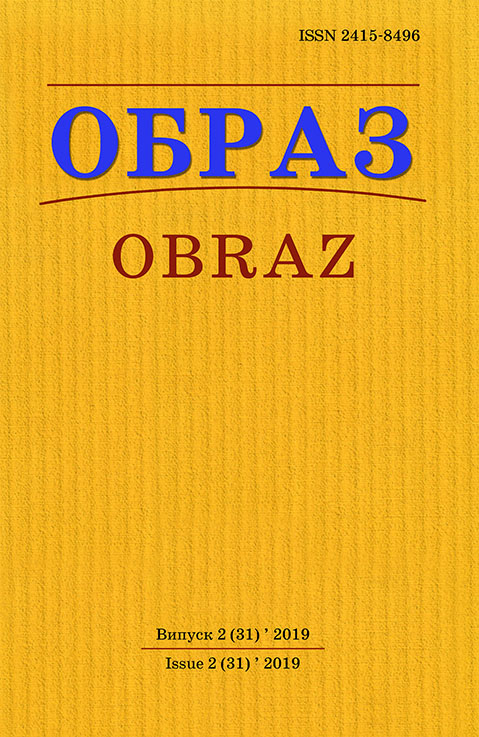Abstract
Introduction. The article deals with the main ways of using of precedent texts in the Internet media of Sumy region. Using precedent texts journalists try to attract the attention of the audience and to make the perceptions qualitative and efficient. What are the main barriers which obstruct to achieve such a result? How can journalists of local Internet media destroy these barriers and improve their skills in using precedent text? The article gives some answers and recommendations for the journalists and editors. Relevance and purpose. Our research shows that local Internet media of Sumy region use precedent texts rarely and not always successfully. So it is important to find out the reasons and the ways of their elimination. The purpose of our research is to reveal the peculiarities of using precedent texts in the Internet media of Sumy region, as well as outline the main thematic, genre, and style features of the materials in which they are used. Methods. We monitored the Internet media of the Sumy region and chose 5 local web sites that can be called online media for the research. The main criteria for for our choice were original texts in Ukrainian and permanent updating of the web sites. To make our research we used such methods as observation, description, analysis and synthesis, induction and generalization. Results. The researched material suggests that: 1. In local Internet media precedent texts can be successfully used for immersion into the topic and actualization of urgent local problems. But the effectiveness of precedent texts depends on the author’s professionalism and the audience’s knowledge.
2. The language of journalists’ texts in regional Internet media is mostly simple and understandable. We rarely find precedent texts in news. They are more often used in blogs and comments. Using precedent texts the authors, try to surprise the reader and they often find an inappropriate statements. This is typical of the local media: the authors use «smart» words, but do not consider the opportunities of their audience. 3. In the texts of the researched Internet media there are a lot precedent texts understandable to the representatives of the local community. 4. Precedent texts are often used to form a particular attitude or cause a particular emotion. In such way they can become a means of manipulation.
References
1. Budnik, A. O., Khyzhniak A. I. (2013) «Precedent texts as an instrument of forming communicative competence in the language-literary education of future linguists», Science and Education a New Dimension: Pedagogy and Psychology, vol. 7, pp. 27-31.
2. Hlukhiv.INFO, Internet media, available at: https://hlukhiv.info/ (access May 20, 2019).
3. Horlach, D (2016) «Clip thinking as a factor influencing the organization of online media», Ukrainskyi informatsiinyi prostir: Naukovyi zhurnal fakultetu zhurnalistyky i mizhnarodnykh vidnosyn Kyivskoho natsionalnoho universytetu kultury i mystetstv, vol.4, pp. 15–19.
4. Karaulov, Yu.N. (1987), Russkiy yazyk i yazykovaia lichnost [Russian language and language personality], Nauka, Moscow, Russia.
5. Krasnyh, V.V. (2002), Etnopsikholingvistika i lingvokulturologiia [Ethnopsycholinguistics and linguistic cultural studies], Gnozis, Moscow, Russia.
6. Lebedyn press, information and news website of Lebedyn, available at: www.lebedinpress. com.ua/ (access May 20, 2019).
7. Merkotan, L. (2016), «Precedent texts in the system of intertextuality», Thesis abstract for Cand. Sc. (Philology), 10.02.01, Yurii Fedkovych Chernivtsi National University, Chernivtsi, Ukraine.
8. Nedelya, regional local newspaper, available at: https://nedelya.info/ (access May 20, 2019).
9. Nedryhailiv sohodni, online newspaper, available at: http://nedrtoday.do.am/ (access May 20, 2019).
10. Pozhydaieva, I.V. (2014), «Precedence as a way of creating the manipulative discourse of blogs», Studia Linguistica, vol.8, pp. 392-398.
11. Website of Konotop city, online media, available at: https://topkonotop.com/ (access May 20, 2019).
12. Tonkikh, I.Yu. (2017), «Internet journalism. Genres on the Internet», tutorial, Zaporizhzhya National Technical University, Zaporizhzhya, Ukraine.
13. Chrdileli, T.V. (2012), «Precedent phenomena as a problem of intercultural communication», Naukovyi visnyk kafedry UNESCO KNLU, Philology. Pedagogy. Psychology, vol. 25, pp. 114– 120.

This work is licensed under a Creative Commons Attribution 4.0 International License.
